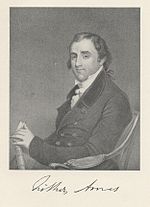Fisher Ames: Difference between revisions
m +DEFAULTSORT |
Damslerset (talk | contribs) No edit summary |
||
| Line 5: | Line 5: | ||
==Life and political career== |
==Life and political career== |
||
Ames was born in [[Dedham, Massachusetts]] and |
Ames was born in [[Dedham, Massachusetts]]. His father, a physician, died when Fisher was but six years old, but his mother resolved, in spite of her limited income, to give the boy a classical education. At the age of six he began the study of Latin, and at the age of twelve <ref>[http://famousamericans.net/fisherames/ Appleton's Cyclopedia of American Biography], edited by James Grant Wilson, John Fiske and [[Stanley L. Klos]] Six volumes, New York: D. Appleton and Company, 1887-1889 </ref> he was sent to [[Harvard College]] graduating in 1774 when he began work as a teacher. While teaching school Ames also studied law. He was admitted to the [[bar (law)|bar]], and commenced practice in Dedham in 1781. |
||
His father, Dr. [[Nathaniel Ames]], "was a man of an acute and active mind, and is best known as the author of the [[Ames Almanac]]s," which were the inspiration for the [[Poor Richard's Almanac]]s.<ref name="register">{{cite journal| author=Erastus Worthingtom| title=Diary of Dr. Nathanial Ames| journal=Dedham Historical Register| year=1890| url=http://books.google.com/books?vid=OCLC06830664&id=QYUg7ThPFTsC&pg=PA1&lpg=PA1&dq=dedham+historical+register#PPA9,M1}}</ref> |
His father, Dr. [[Nathaniel Ames]], "was a man of an acute and active mind, and is best known as the author of the [[Ames Almanac]]s," which were the inspiration for the [[Poor Richard's Almanac]]s.<ref name="register">{{cite journal| author=Erastus Worthingtom| title=Diary of Dr. Nathanial Ames| journal=Dedham Historical Register| year=1890| url=http://books.google.com/books?vid=OCLC06830664&id=QYUg7ThPFTsC&pg=PA1&lpg=PA1&dq=dedham+historical+register#PPA9,M1}}</ref> |
||
Revision as of 00:04, 12 November 2007

| Part of a series on the |
| History of Dedham |
|---|
 |
| Main article |
| Dedham, Massachusetts |
| By year |
| By topic |
Fisher Ames (April 19, 1758–July 4, 1808) was a Representative in the United States Congress from the 1st Congressional District of Massachusetts.
Life and political career
Ames was born in Dedham, Massachusetts. His father, a physician, died when Fisher was but six years old, but his mother resolved, in spite of her limited income, to give the boy a classical education. At the age of six he began the study of Latin, and at the age of twelve [1] he was sent to Harvard College graduating in 1774 when he began work as a teacher. While teaching school Ames also studied law. He was admitted to the bar, and commenced practice in Dedham in 1781.
His father, Dr. Nathaniel Ames, "was a man of an acute and active mind, and is best known as the author of the Ames Almanacs," which were the inspiration for the Poor Richard's Almanacs.[2]
In 1788, he served in the Massachusetts House of Representatives. He became a member of the Massachusetts convention that ratified the United States Constitution that same year.
Ames was elected to the First, Second and Third Congresses and as a Federalist to the Fourth Congress. He served in Congress from March 4, 1789 to March 3, 1797. During the First Congress, he was chairman of the Committee on Elections. In 1796, he was not a candidate for renomination but resumed the practice of law in Dedham. He stayed in politics and was a member of the Governor's Council from 1798 to 1800. In his new role, Ames offered one of the great orations on the death of President Washington. He also published a number of essays, critical of Jefferson's followers.
In 1805, Ames was chosen president of Harvard University. He declined to serve because of failing health. Four years later, in 1808, he died in Dedham on July 4. He was interred in the Old First Parish Cemetery after a public funeral in Boston.
Despite his limited number of years in public service, Fisher Ames ranks as one of the more influential figures of his era. Ames led Federalist ranks in the House of Representatives. His acceptance of the Bill of Rights garnered support in Massachusetts for the new Constitution. His greatest fame however may have come as an orator. Ames offered one of the first great speeches in American Congressional history when he spoke in favor of the Jay Treaty.
In 2002 the Ames Christian University was named after Fisher Ames.
Quotes
- "We are, heart and soul, friends to the freedom of the press...It is a precious pest, and a necessary mischief, and there would be no liberty without it." [citation needed]
- "A government by the passions of the multitude, or, no less correctly, according to the vices, and ambitions of their leaders is a democracy." [citation needed]
- "I consider biennial elections as a security that the sober, second thought of the people shall be law."[3]
References
- ^ Appleton's Cyclopedia of American Biography, edited by James Grant Wilson, John Fiske and Stanley L. Klos Six volumes, New York: D. Appleton and Company, 1887-1889
- ^ Erastus Worthingtom (1890). "Diary of Dr. Nathanial Ames". Dedham Historical Register.
- ^ Dedham Times, Vol 14, No. 45, November 3, 2006
"The rights of conscience, of bearing arms, of changing the government, are declared to be inherent in the people." -Fisher Ames
Further Reading
- Dictionary of American Biography: Ames, Fisher;
- Works of Fisher Ames: With a Selection from His Speeches and Correspondence. Edited by Seth Ames. 2 vols. 1854. Reprint. New York: DaCapo Press, 1969;
- Bernhard, Winfred E.A. Fisher Ames: Federalist and Statesman, 1758-1808. Chapel Hill: University of North Carolina Press, 1965.
